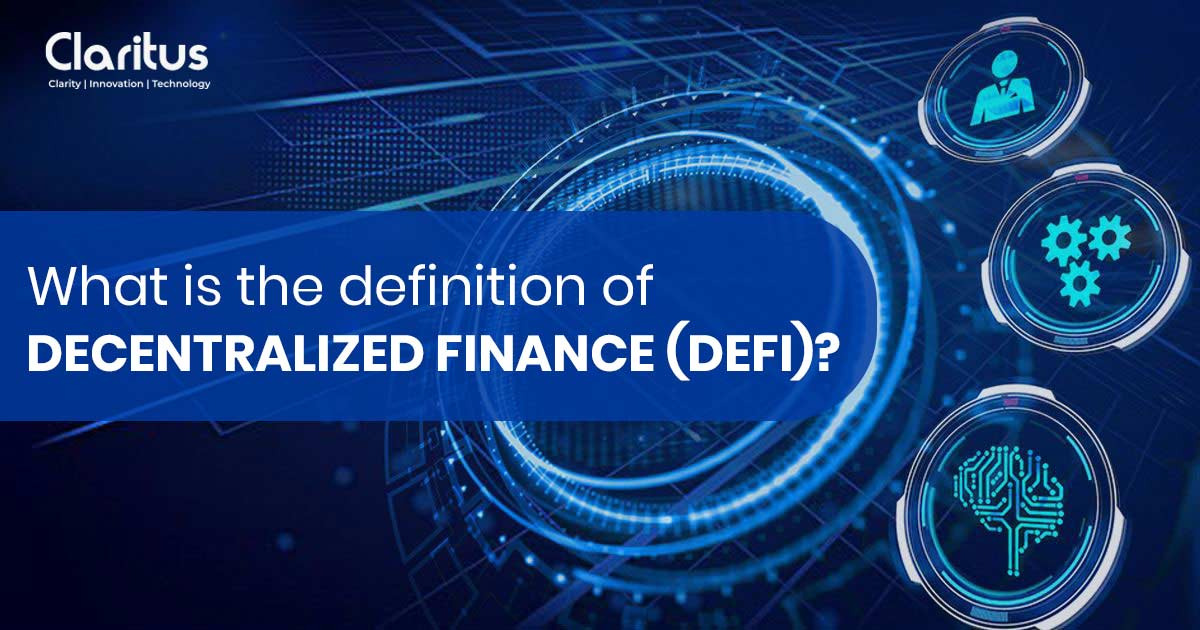What is the definition of Decentralized Finance (DeFi)?

Introduction of Decentralized Finance (DeFi)
Decentralized Finance (DeFi) is a generic expression for multiple financial applications and services on cryptocurrency or public blockchains, especially Ethereum. It helps to accomplish most of the things that take place in financial transactions including, borrowing, earning interest, trading assets and buying insurance etc. Decentralized Finance (DeFi) gathers inspiration from blockchain which is the technology that works for the digital currency Bitcoin. It permits holding of a copy of the record of transactions, which means that it is not managed by a single, central outfit.
The emerging technology is used to discard third parties and centralized institutions from any financial dealing. A decentralized system, the financial resources and assets framework of DeFi works on numerous computer networks that double up as public ledgers storing digital copies of the commercial dealings. Centralized systems and human custodians restrict the pace while reducing the smoothness and elegance of the transactions. However, DeFi is swifter, paperless, doesn’t require a third party, and being global, as well as peer to peer, open to all.
Benefits of Decentralized Finance:
Programmable
Jobs and assignments that usually need a human can be automated with the help of crypto smart contracts. This creates fresh opportunities for products and services, related to financing instruments and also reduces the possibilities of human error.
Openness
Access is available just by creating a wallet. There’s no need to “open” an account or apply for anything. Unrestricted access can be enjoyed by the masses because crypto technologies do not depend upon authorization from any central agency for participation.
Pseudonymous
There is absolutely no necessity to furnish personal information like name, email address etc.
Security
For interaction with DeFi a non-custodial wallet is required which means that one has total control of the crypto currencies, assets and private keys. It’s not needed to count on any centralized set-up. The wallet paves the way for copying a 12 word phrase which should be kept in safe custody, for instance, in a fireproof safe.
Swiftness
DeFi transactions happen in a matter of minutes or hours, whereas traditional financial transactions take approximately 3 to 5 days. So, money changes hands very swiftly. Again, interest rates and rewards routinely revise very quickly, almost as fast as every 15 seconds and may be substantially higher than conventional rates.
Transparency
Everybody associated can view the immutable transaction data, as the crypto networks depend on public blockchains. So, the data can neither be changed nor tampered with. This sort of transparency is seldom allowed by traditional businesses.
Flexibility
Assets can be shifted from one place to another at any time. Additionally, permission, time-consuming transfers and expensive fees are all redundant.
Some Uses of DeFi:
- DeFi can be utilized for lending. Crypto can be lent and interest or rewards earned each minute.
- It can also be used for getting a loan. Obtainment of a loan is instantaneous without the need for paperwork. Extremely short-term “flash loans” are also available which the conventional financial establishments do not offer.
- Trading is facilitated. Peer to peer trades of some crypto assets are possible, just like buying and selling stocks without any brokerage whatsoever.
- A savings account can be created, and some crypto can be deposited in the account as future savings. Interest rates are better than that offered by a bank.
- People also engage with DeFi to buy derivatives. These can be treated as crypto version of future contracts or stock options.
- DeFi is present in the gaming world as well. Gamers may now unravel the chances to manage their in-app purchases sans the threat of credit card hacks. This is bound to intensify the gaming experiences without much concern or apprehensiveness about finances.
- Another application of DeFi is peer-to peer payments system. All top decentralized finance applications provide this service to the users. DeFi elevates the advantage of blockchain technology to the next level by building a further open area for securely and reliably receiving or sending payments across the world.
Conclusion
It appears that Decentralized Finance may alter the future of wealth management. Just a decade back it was impossible to envision something like a total decentralized finance. Notwithstanding this, blockchain technology has steadily cleared the way for the next hi-tech revolution for us.
